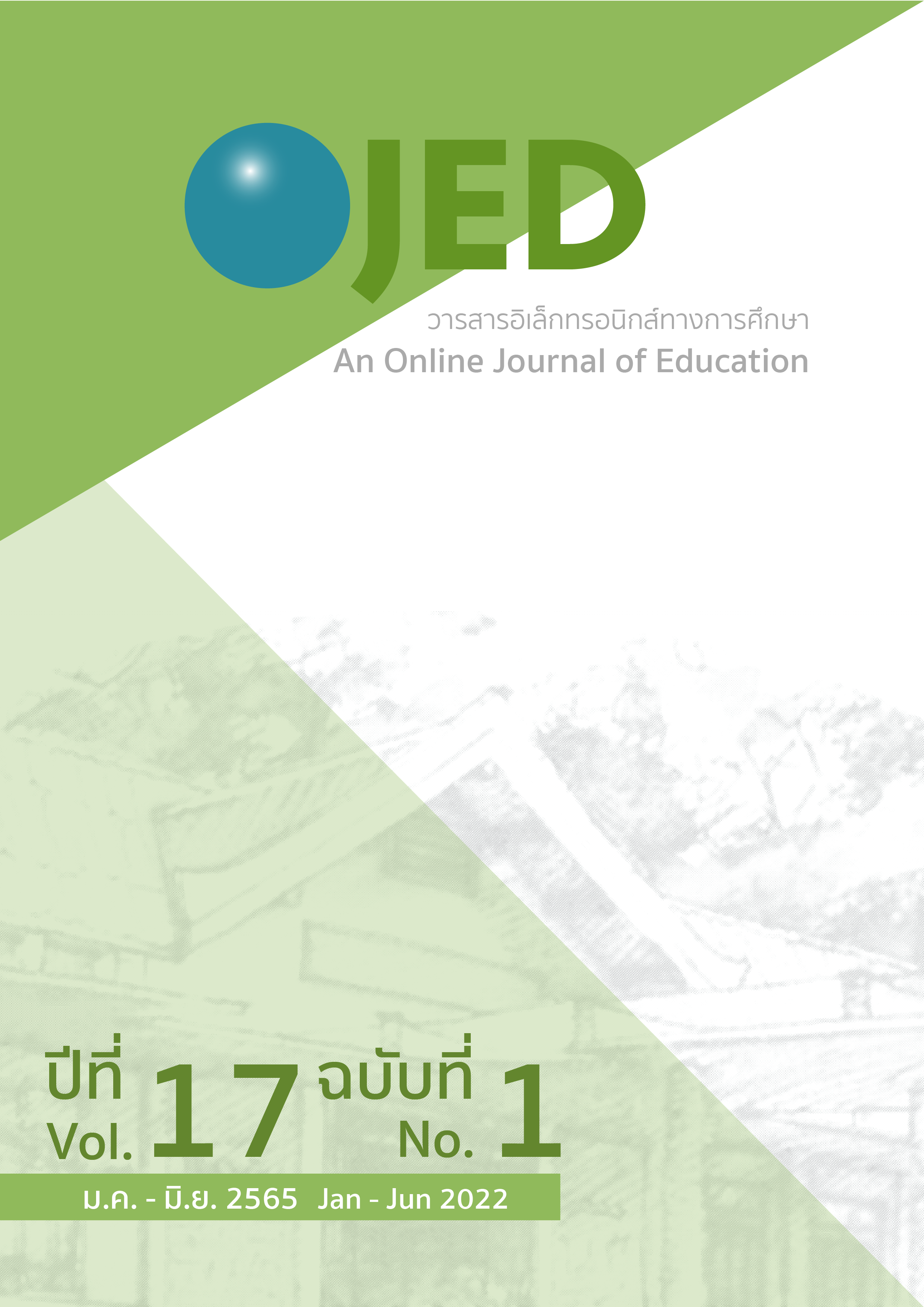Development of English-Speaking ability using Digital Storytelling Techniques through Virtual Instruction for Lower Primary Students in Bhutan
DOI:
https://doi.org/10.14456/ojed.2022.21Keywords:
digital storytelling, text storytelling, virtual instruction, speaking abilityAbstract
This study examined the development of English-speaking ability using digital storytelling techniques through virtual instruction for lower primary students in Bhutan. The objective of this study was to examine 1) to what extent do digital storytelling techniques through virtual instruction develop the speaking ability of lower primary students in Bhutan, and 2) the students’ opinions towards the use of digital storytelling techniques through virtual instruction on developing their speaking ability. The participants were 30 lower primary level students from one of the schools in Bhutan. The study adopted a mixed method approach. Two tools were used to collect data, a semi-structured interview and a pre post achievement test. Quantitative data were analyzed by paired sample t-test, and qualitative data were analyzed by content analysis. The findings of the study showed that there was a significant difference between the students’ mean scores in pretest and posttest at the significant level of .05. The findings also indicated that digital storytelling has a positive effect on developing pronunciation, vocabulary, grammar, fluency and comprehension. The results of the interview reported that the implementation of the treatment had a positive effect on the students’ speaking ability. This study also recommended that digital storytelling should be used for enhancing students speaking abilities in lower primary schools.
References
Biddha, S., & Thinley, D. (2010). Building students’ oral fluency: Perspectives on the use of spoken English in Bhutanese classrooms. RABSEL the CERD Edu.
Brown, H. D. (2004). Language assessment: Principles and classroom practices. Pearson.
CAPSD. (2006a). English Curriculum Guide for Teachers: Class VI. Department of School Education, Ministry of Education, Royal Government of Bhutan.
CAPSD. (2006b). English Reading & Literature: Class VII. Curriculum and Professional Support Division, Department of School Education, Ministry of Education, Royal Government of Bhutan.
Cohen, A. D. (2014). Strategies in learning and using a second language (2nd ed.). Routledge.
Davidson, C. (2009). Transcription: Imperatives for Qualitative Research. International Journal of Qualitative Methods, 8(2), 35–52. https://doi.org/10.1177/160940690900800206
DDC. (2002). Dzongkha-English Dictionary. Dzongkha Development Commission.
Elenein, A. H. A. A. (2019). The Effect of Utilizing Digital Storytelling on Developing Oral Communication Skills for 5th Grade Students at Rafah Primary Schools. International Journal of Language and Literary Studies, 1(1), 30-46.
EPGI. (2007). 26th Education Policy Guidelines & Instructions. Ministry of Education. https://planipolis.iiep.unesco.org/sites/default/files/ressources/bhutan_epgi_2007.pdf
Gyamtso, D., & Maxwell, T. (2012). Present Practices and Background to Teaching and Learning at the Royal University of Bhutan (RUB): A Pilot Study. International Journal of Teaching and Learning in Higher Education, 24(1), 65–75. https://files.eric.ed.gov/fulltext/EJ977183.pdf
Khodabandeh, F. (2015). The impact of storytelling techniques through virtual instruction on English students’ speaking ability. Teaching English with Technology, 18(1), 24-36.
Laksana, A. J. (2016). The effectiveness of using chain story game in teaching speaking. http://repository.ump.ac.id/2221/
LaPrairie, M. (2014). A case study of English-medium education in Bhutan (Unpublished doctoral dissertation). University of London.
Lestariyana, D. R. P. & Widodo, H. P. (2018). Engaging young learners of English with digital stories. Indonesian Journal of Applied Linguistic, 8(2), 489-495. https://doi.org/10.17509/ijal.v8i2.13314
Ministry of Education. (2016). Educational Statistics in 2016. http://en.moe.gov.cn/documents/statistics/2016/national/
Mirza, H. S. (2020). Improving university students’ English proficiency with digital storytelling. International Online Journal of Education and Teaching, 7(1), 84–94. https://eric.ed.gov/?id=EJ1244258
Ornek, F., Robinson, W. R., & Haugan, M. R. (2007). What Makes Physics Difficult?. Science Education International, 18(3), 165-172.
Putri, A. (2019). Digital Storytelling Implementation for Enhancing Students’ Speaking Ability in Various Text Genres. International Journal of Recent Technology and Engineering (IJRTE). https://www.researchgate.net/publication/338486569_Digital_Storytelling_Implementation_for_Enhancing_Students’_Speaking_Ability_in_Various_Text_Genres
Rahayu, A. S. (2021). The use of digital storytelling narrative text to enhance students speaking activities and ability at senior high school: A case study at the 10th grade of Al-Ittihad Vocational High School Cianjur. Digilib.uinsgd.ac.id. http://digilib.uinsgd.ac.id/46315/
Rance-Roney, J. (2008). Digital storytelling for language and culture learning. Essential Teacher, 5(1), 29–31.
Robin B., & Pierson M. (2005). A multilevel approach to using digital storytelling in the classroom. Society for Information Technology & Teacher Education International Conference. Association for the Advancement of Computing in Education (AACE) (pp. 708–716).
Royal Education Council. (2011). Annual Education Statistics (Rep). http://www.education.gov.bt/statistics
Turula, A. (2017). Learner autonomy as a social construct in the context of Italki. Teaching English with Technology, 17, 3-28. Research Gate. https://www.researchgate.net/publication/316957700_Learner_autonomy_as_a_social_construct_in_the_context_of_Italki
World Bank. (2009). Findings from the Bhutan Learning Quality Survey. https://openknowledge.worldbank.org/handle/10986/17940
World Bank. (2013). Country Partnership Framework for the Kingdom of Bhutan for the Period FY2021-24.
Downloads
Published
How to Cite
Issue
Section
License
Copyright (c) 2022 An Online Journal of Education

This work is licensed under a Creative Commons Attribution-NonCommercial-NoDerivatives 4.0 International License.




